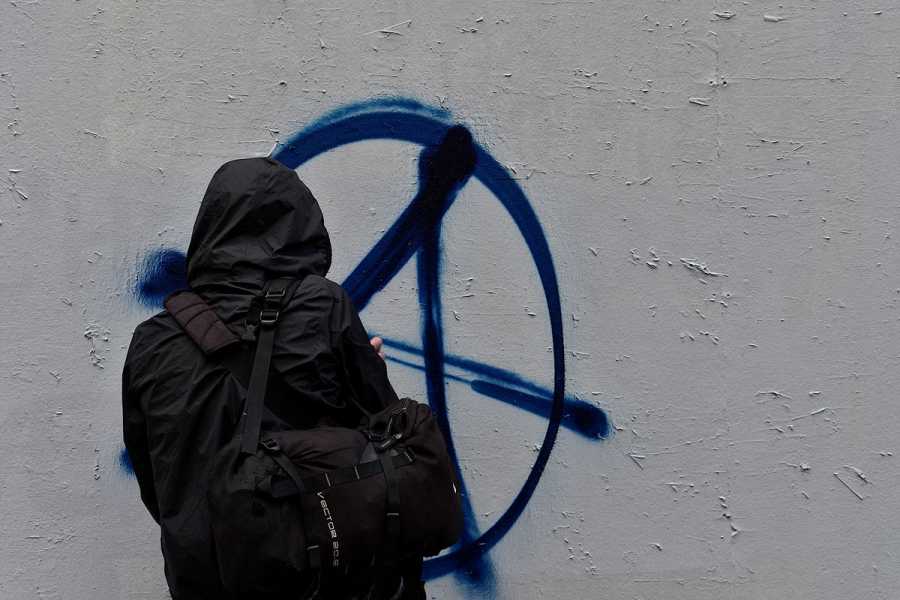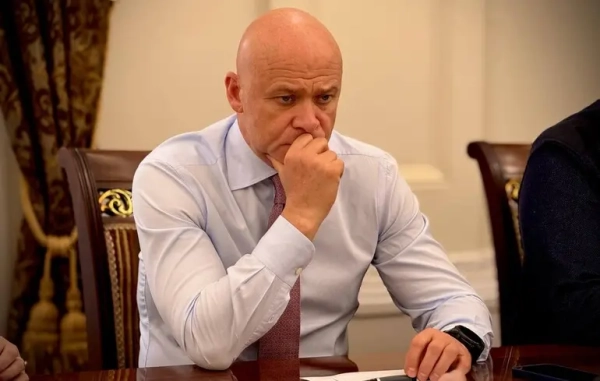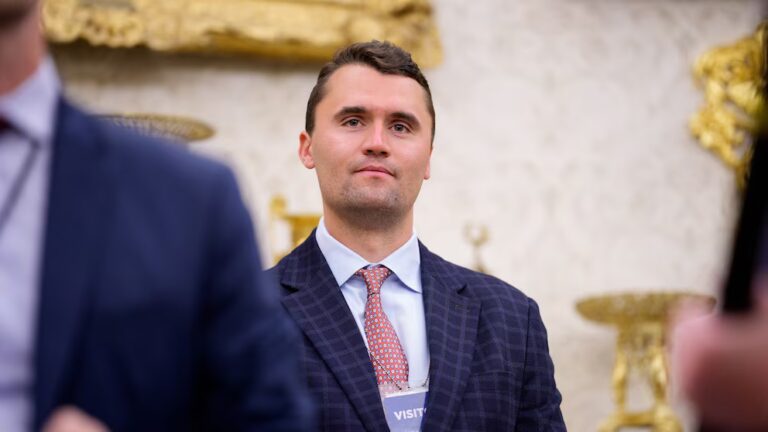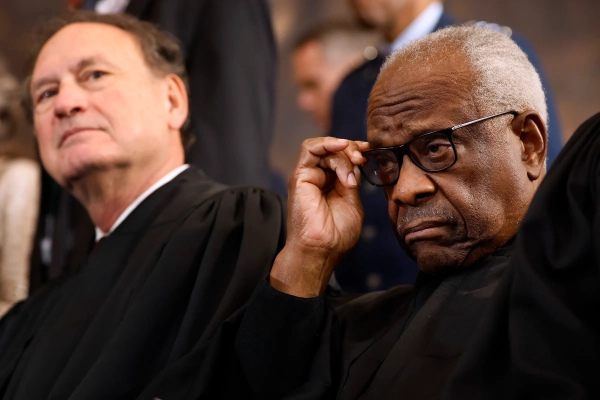Why it isn’t the same as chaos.

A protester in Marseille, France, tags a wall with the anarchy sign during a demonstration against pension reform. Gerard Bottino/SOPA Images/LightRocket via Getty Images
When you think of anarchism, what comes to mind?
Maybe you have some vague image of a punk rocker with the Circle-A symbol scratched into her jeans. Or some comic-book supervillain out to destroy the world that spurned him. Those are fun caricatures, but anarchism is actually a rich tradition of thought going back centuries, and it was at the center of utopian leftism until Marxism came along.
Today, though, Marxism and other lefty ideologies don’t have nearly the purchase they once did, and it’s not entirely clear what, if anything, has filled that void. That lack is all the more interesting given our current moment, when so many conventional ways of doing and thinking about politics are being challenged.
So, in that spirit, I invited Sophie Scott-Brown onto The Gray Area to talk about the history of anarchism and its relevance today. She’s a research fellow at the University of St. Andrews and the director of Gresham College in London. She’s also the author of a new book, Colin Ward and the Art of Everyday Anarchy, which is a fascinating look at the potential of anarchist ideas through the work of the well-known British writer.
Below is an excerpt of our conversation, edited for length and clarity. As always, there’s much more in the full podcast, so listen and follow The Gray Area on Apple Podcasts, Google Podcasts, Spotify, Stitcher, or wherever you find podcasts. New episodes drop every Monday.
Sean Illing
We’re all familiar with the stereotypes, but as someone who thinks seriously about anarchism, what does the term mean to you?
Sophie Scott-Brown
Yeah, I completely accept the stereotypes. Before you can get to any sort of serious anarchist philosophy, you have to do quite a lot of work deconstructing that for people. So here’s a working definition that might help. Anarchism, if you just take the very word itself, all it entails is a commitment to a lack of permanent authority.
Now, what you then want to do imaginatively after that is wide open. Dare I say there’s a lot of propaganda out there suggesting there has to be chaos and disorder and violence and crime. But the concept itself simply says no permanent authority, and that’s about the one thing you can say that really connects up a lot of people who might use that term to describe their beliefs.
Sean Illing
I heard someone say once that anarchism is “democracy taken seriously.” I’m not sure how accurate that is, but I like it.
Sophie Scott-Brown
I think that’s precisely right. There’s a spectrum of anarchisms, so I’ll stress that before I get lots of complaints. However, I would actually argue, philosophically speaking, if you’re going to take that first notion that we started with — that anarchism is a commitment to an absence of permanent authority — that does refine your options a little bit more.
Sean Illing
Is there a particular species of anarchism that you identify with?
Sophie Scott-Brown
I mean, for me, if you want the philosophical roots of it, it comes very much from the Italian rhetorical tradition. So figures like Cicero going through to Vico, people who actually believed that the nuts and bolts of living together means communication, means dispute, means arguing, essentially, but arguing in such a way where the results are not catastrophic. So conflict, I think, is a feature of life. The challenge for us is to not make that conflict catastrophic.
So if you accept that conflict’s going to be a ubiquitous feature of life, you say to yourself, “Okay, well, how do I deal with conflict so that it’s not only not catastrophic, but actually creative?” We want to be ambitious with it. We want to know how to live in a world where our conflicts, our differences, our collisions, can be very creative. And that, to me, is the essence of what a full and most radical democratic culture would look like.
Sean Illing
Do you think it’s better to think of anarchism as a practice rather than an ideology?
Sophie Scott-Brown
I certainly do. I think in some ways the big challenge anarchism gives to us these days, and why it’s so removed from where we’re at now but also why it’s going to be essential for the world that we’re going into, is that it comes away from this whole notion that politics always has to have an end game. It’s going to be a utopia. It’s going to be the ideal society. There was always an element of utopianism in anarchism, let’s not lie about that, but for me, I feel like we’re reaching times now where people have very little patience with utopian notions.
I mean, sure, wouldn’t it be nice to live in a world without constant warfare? That kind of utopian thinking has a life and a place, but anything more specific, I think we’ve perhaps grown out of that. And therefore this idea of anarchy as a habit of mind or an attitude or a way of thinking and being in the world is useful for thinking about a politics of constant change. You’ve got to think about a politics which accepts that you’re never going to have the truth or the facts or the safe ground under your feet to know you’re right. So how do you live with an ability to adapt? How do you live with contingency? How do you live with the fact that you’re going to be involved in lots of different kinds of problems, probably simultaneously?
Sean Illing
What would you say is the most promising anarchist idea that seems relevant to this political moment?
Sophie Scott-Brown
Decentralization, or the idea that permanent authority is the real bugbear. This is a bit provocative, but even things like codes of law and rights and things like that, they have their purpose and their reason, or they certainly did have their purpose and reason, but increasingly we’re looking at a world where we simply have to get better at taking more responsibility.
Anything like government or systems of law, what are they? They’re actually heuristics. They’re shortcuts for an awful lot of moral and political discussion and reasoning, and people forget that they’ve compressed those discussions into a series of rules of thumb. And we are increasingly not teaching ourselves or troubling ourselves to have those complex conversations between ourselves, and so the tail is sort of wagging the dog now. We’re becoming very subject to all these systems and structures, which emerged at times that were so unbelievably different from how we’re living now and they’re not fit for purpose anymore, and so it’s no surprise that they’re cracking up around us.
Sean Illing
It does seem like a lot of this comes down to whether or not one views human conflict as ultimately creative or ultimately destructive, whether it’s the beginning of cooperation or the end of conversation.
Sophie Scott-Brown
Well, you have the famous quote, it’s usually attributed to Bakunin, “To destroy and to build again.” There is a vein running through anarchism, which has often been part of the reason why it’s been associated with violence and violent insurrection and chaos and disorder and that sort of thing. But to destroy and to build again can be taken perfectly metaphorically. It’s this idea that actually destruction and creation are simultaneous things. Any act of creativity is simultaneously destroying some possibilities in favor of others.
Sean Illing
Every political philosophy, either implicitly or explicitly, is built on a theory of human nature, and I guess I’m wondering what the anarchist view of human nature is. Or maybe I should ask what your view of human nature is because I’m sure there are many different views of human nature within the anarchist community.
Sophie Scott-Brown
Well, those pesky anarchists, as you’re saying, have pretty much adopted all of the familiar views of human nature and managed to turn anarchism to their advantage in every single possible definition. So you do have those like Peter Kropotkin, the 19th-century Russian anarchist, who are very optimistic about human nature. They think we’re basically social beings and we’re being inhibited or prevented from doing that by these coercive, life-denying, authoritarian structures. Therefore, if we get rid of those, it’ll be an easy win. People will find it remarkably easy to be cooperative.
But then you have people like Alex Comfort, for example, who is a 20th-century British anarchist who wrote around the 1940s and 1950s, and he took what he called a much more realistic view. He argued that humans aren’t going to be like that at all. They’re going to collide with each other constantly, so the game in town is how do you manage that conflict? If it’s inevitable, if you can’t be too optimistic about everyone’s social capacity, how can you distribute your society, distribute your decision-making power, distribute your economic power, so nobody ever gets enough to have a critical mass that can overtake everybody else?
My view is a total copout, Sean. I think human nature is incredibly malleable. I think it can be many, many, many things. I think we’re like the ultimate actor in neutral, waiting for the next role.
Sean Illing
Can you be an anarchist and still believe that there are fundamentally evil human beings?
Sophie Scott-Brown
Well, I personally don’t, which is sometimes really difficult to maintain. I don’t believe in evil. What I would say is people certainly have the capacity for it, a shocking capacity for it. And I’m not a full environmentalist in the sense that I don’t think that if only these people had a nice progressive education and lots of drama classes when they were young, everything would’ve been fine. It might’ve been. In many cases, it probably could have been, but actually we don’t quite know what that tipping point is. I would be happier calling it a capacity rather than anything more profound.
Sean Illing
I do think that human beings are pretty plastic and often we are as good or bad as the world allows us to be. I also believe that evil, for lack of a better word, is a real thing. And I say that as a secular person, not a religious person. And even if we constructed the most practical utopia ever, I think we would still need police and armies. Now, an anarchist might say that people can be wicked, but it’s power that makes them that way. I think there’s some truth there, but it also seems importantly incomplete. Some people are just wicked whether they have power or not. Would you disagree with that?
Sophie Scott-Brown
Well, it’s a big gamble to take, isn’t it? I have to ask myself, on balance, is the damage [done by] having things like a permanent police force or a judiciary system skewed in a particular historical social context? Does the damage outweigh the reality that these institutions can actually be the source of so many problems?
Sean Illing
These aren’t easy questions, I get that. I would say that I agree with you that the vast majority of people are not “cruel and disordered” when they’re not governed. I guess I just think that some people are, and the problem is that it doesn’t take many cruel and disordered people to make life impossible for everyone else. And that to me is the crucial political problem, how to deal with that. And I’m not sure anarchy can or does, but I could be wrong.
Sophie Scott-Brown
Let’s flip this upside down. We’re talking about that rare individual who is beyond all reasonable measure, but what we could talk about is all those other people. And I actually think they are really interesting, those other people. Who are they? We don’t quite know.
But if we take the situation we have now where we have minorities on either end. We have a relative minority of people who are unbelievably kind, you’d call them saintly if you were religious, and then you have the tiny minority of people who we’ll call evil for want of any other word. And then you have this sort of spectrum of people in between the two.
These are always the really interesting people. They’re the people who are very unpredictable, and that’s wonderful in a way because you never know where they’ll go with a particular issue on a particular day. But they’ll be very responsive to a situational logic rather than some sort of deep ideological commitment to anything. And I think there’s enormous potential there, which is largely ignored or squandered.
People really dismiss everyday sorts of intelligence and reasoning and logic, and because it’s dismissed, because we’re constantly trying to come up with these official measures of what we should be and who we should be, we actually miss that, half the time, we’re perfectly functional anarchists already.
Sean Illing
There’s so much in anarchism that appeals to me, but I’m not sure it could ever work at scale. And yet you could pose that question about any political order. I fear that one of the lessons of the 20th and 21st centuries might be that humans are not especially equipped to live in large symbolic communities without material connections and shared ways of living. So maybe anarchism could work, but only in smaller, more localized ways?
Sophie Scott-Brown
I think that’s broadly right. This idea that you have to have anarchist nations or even anarchist unions, if you like, well, yes you could, but maybe let them take care of themselves. If they happen, they happen. But what might be more interesting is this notion of being intensely local while being simultaneously global. I’m trying not to use that old but very useful cliche, “Think global, act local,” but it’s got traction here.
Let’s say, for example, that we accept that there are idealistic and ethical and practical reasons why it would be great to see more worker control of industrial democracy in our workplaces. Why is it that we have to retain these fairly doddery, very hierarchical structures of decision-making, which as we know even now are still not particularly diverse?
We’re under so much pressure to keep educating people for longer and longer because now we’re told it’s a lifelong process of learning to keep abreast of everything in order to stay employed. Well, if you’re going to keep this highly educated population, are you honestly going to be surprised when they start getting very resentful about being treated like rube mechanicals in their workplaces? I don’t think we need to worry about anarchist nations or anything like that. A much more healthy approach is to start local by giving more workers more control over their lives and their democracy.
To hear the rest of the conversation, click here, and be sure to follow The Gray Area on Apple Podcasts, Google Podcasts, Spotify, Stitcher, or wherever you listen to podcasts.
Sourse: vox.com






